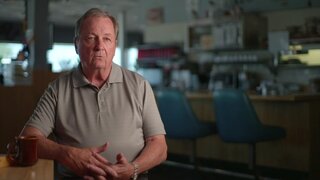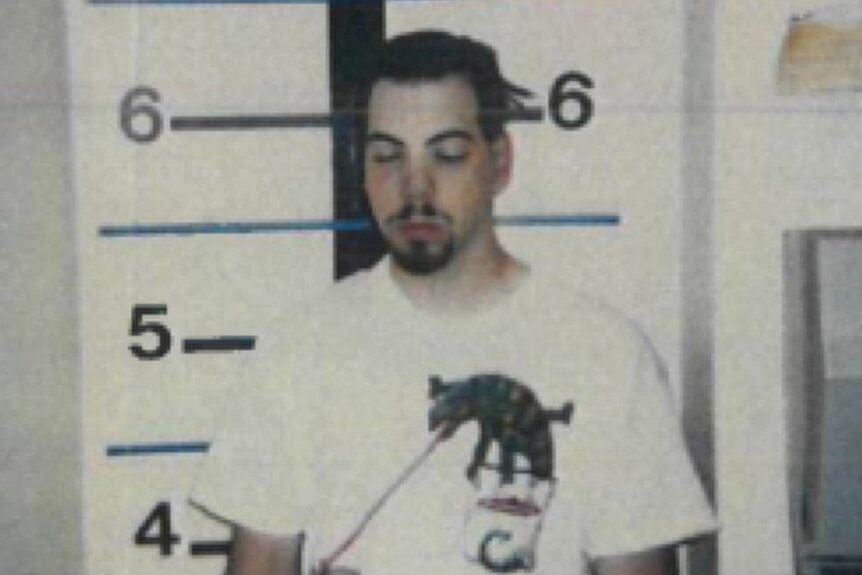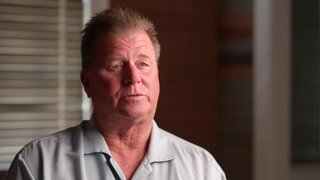Create a free profile to get unlimited access to exclusive videos, breaking news, sweepstakes, and more!
Men Confess to 1998 Murder of Vulnerable Texas Teen "Basically Used For Target Practice"
Two young men laughed when recounting how they murdered 19-year-old Amy Robinson, a woman living with Turner Syndrome who disappeared while riding her bicycle to work.
A vulnerable 19-year-old seeking independence vanished while bicycling to her job at a grocery store in a case that left law enforcement “speechless.”
In 1998, Amy Robinson was a young woman who’d primarily been raised by her grandmother in Arlington, Texas — a town about 15 miles east of Fort Worth and 20 miles west of Dallas. The recent high school graduate was an inspiration to many for achieving her dreams despite living with Turner Syndrome, a genetic condition that left her with the mindset of a 14-year-old, according to her grandmother, Carolyn Maifeld.
“Turner Syndrome did not stop her from doing anything,” her sister, Amanda Robinson, told Prosecuting Evil with Kelly Siegler, airing Saturdays at 8/7c on Oxygen.
Amy had not only proudly received a diploma and competed in local Special Olympic races but also loved having the independence to take her green bicycle to a nearby grocery store, where she bagged groceries for a living.
RELATED: Prosecuting Evil Shows How Kelly Siegler Wouldn't Back Down from "The Devil Himself"
“Amy is a person who didn’t ever see any evil or bad in anything or anybody,” said her uncle, Darrell Massey. “I think it was just her nature. She just didn’t believe anybody had bad in them.”
Amy Robinson goes missing

Those close to Amy wondered if this child-like trust had anything to do with why, on February 15, 1998, she never arrived at her shift. Though she’d left the house at around 12:30 p.m., by 4:15 p.m., she was nowhere to be found, prompting her manager to sound the alarm.
Amy’s father called the Arlington Police Department, reporting the teen was last seen with her bicycle and a plastic bag containing her uniform, according to the Arlington P.D. Sgt. Mark Simpson. Sgt. Simpson said it was a “direct route” between Amy’s home and the grocery store.
“That was the last she was seen,” he said.
A possible connection to another high-profile case
Amy’s uncharacteristic disappearance sparked a massive search, which included grid searches, helicopters, and public appeals.
“The fact that she was missing was everywhere in Arlington,” Tarrant County Prosecutor Christy Jack told Prosecuting Evil, acknowledging the heavy presence of community support.
Meanwhile, Arlington P.D. spoke with Amy’s associates, learning she was “universally liked” by all, according to Sgt. Simpson. At the time, police also looked into former associate, 23-year-old Robert Neville.
“Some of the people at the store had said [Robert Neville] and Amy Robinson were sort of in a boyfriend-girlfriend situation,” said Arlington Police Detective John T. Stanton Sr. “But when questioned, Robert Neville said, ‘Nah, we were just kinda friends through work.’”
Neville told police that on the day Amy disappeared, he made a brief appearance at Kroger before he and his friend, 19-year-old Michael Hall — another former associate — headed to the mall, spending hours playing video games.
Neville was cooperative with police and even volunteered to take a lie detector test, passing with a “marginal” score, according to investigators.
But then, days into the search for Amy, a tipster called police, claiming she’d seen Amy speaking with a white male in his 40s or 50s before he helped her put her bicycle in the bed of his red pickup truck.
The scenario rang familiar to police, with similarities parallel to the high-profile abduction and murder of Arlington 9-year-old Amber Hagerman, a case that ultimately led to the creation of the Amber Alert. In Hagerman’s 1996 case, witnesses claimed to see someone abducting the child from her bicycle in an abandoned grocery store parking lot before speeding away in a pickup truck.
Several days later, Hagerman was found stabbed to death in a creek, a case that remains unsolved today.
Ten days after Amy Robinson and her bicycle vanished, countless community members — including Amber Hagerman’s mother — continued with the search.
RELATED: How Prosecuting Evil Is Different From Cold Justice, According to Kelly Siegler
A Much-Needed Break in the Case
A break in the case came when Karen Hall, the mother of Michael Hall, visited the police station and reported something she’d heard about her son.
“She explained that Michael’s stepbrother told her that Michael Hall basically gave a full confession about how he and Robert Neville took Amy out to this wooded area, and they killed her,” Det. Stanton told Prosecuting Evil.
“I never dreamed about her being murdered,” said an emotional Maifeld.
Tarrant County officials issued an arrest warrant for Hall and Neville, charging both men for Amy Robinson’s murder. Despite the new information, authorities had yet to learn the whereabouts of Amy’s body.
When it came time to take the suspects in, both were on the run with a 3-day head start, according to Sgt. Simpson.
On February 28, 1998 — 13 days after Amy disappeared — another tip came to authorities. This time, a local car dealer reported he’d lent Neville an El Camino while Neville’s regular car was being repaired. Sometime after Amy’s disappearance, Neville returned the vehicle, where a crossbow was “clearly visible” in the car’s bed.
Police deemed the men armed and dangerous for fear they would harm another person.
On March 3, 1998, Neville and Hall were stopped at the International Bridge in Texas’s Eagle Pass — more than 400 miles southwest of Arlington at the Mexican border. Both were taken into custody and housed at the local jail.
Chilling confessions lead to the body of Amy Robinson
Law enforcement in Arlington raced to reach Eagle’s Pass, where the suspects had no qualms about speaking to customs agents about the murder of Amy Robinson. In fact, according to Sgt. Simpson, both men were “almost happy” when giving their versions of what happened.
Later that day, Arlington Police used the men’s details and traveled to Mosier Valley on the outskirts of Fort Worth near Hurst, Texas, just over eight miles from Amy’s home. Sgt. Simpson said there was “no question” that a clothed body in the grassy field belonged to the missing teen, as published in video obtained by Prosecuting Evil. Her missing bicycle was found nearby.
“[It’s] no way for a child to die,” said Sgt. Simpson. “[It’s] no way for anybody to die.”
A postmortem examination revealed the victim had been shot to death, according to NBC Dallas-Fort Worth affiliate KXAS-TV.
As horrible as the crime was, Neville and Hall’s confessions — recorded by local media outlets before Arlington officials could reach Eagle’s Pass — left Sgt. Simpson “speechless.”
Neville showed zero remorse when he told reporters that he helped kill Amy “for the adrenaline rush.”
Hall smiled as he recounted the crime for the cameras, explaining how Amy “kept griping” about being late to work after they lured her into the vehicle, to which Hall responded, “Well, you’re late now.”
He referred to Amy as “a moving target,” calling it a “pretty good” shot when he shot the victim in the back of the leg. Hall continued to laugh when recalling Amy said, “Ow, that hurt,” to which both men “bust[ed] out laughing.”
Neville said he “died laughing” after realizing what had happened.
“I thought there were very few surprises left as a prosecutor,” Jack told Prosecuting Evil. “I never seen anything like that, when I watched them laugh.”
For Amy’s grandmother, Carolyn Maifeld, she believed the men were trying to reenact Natural Born Killers, a violent 1994 film about a serial-killing couple on the run. And for Christy Jack, herself a mother of a special needs child, the case hit close to home.
“Something cried out for justice in [Amy’s] case, more so than any other case I’ve ever been involved with,” said Jack.
The Capital Murder Trials and Convictions

Neville and Hall were tried separately, with both eligible for the death penalty if convicted. In Texas, to make the case a capital one, prosecutors had to prove murder plus an underlying felony, which, in this case, was kidnapping.
Neville’s trial began on December 2, 1998, and the prosecution scrutinized his disturbing history.
“He began setting fires as young as the age of four,” Jack told Prosecuting Evil. “Not only do you have sexual abuse of children, there are multiple reports of Robert abusing animals. A neighbor saw him throwing kittens off of a roof. A cousin reported Robert tying a cat to a tree and beating it with a pole.”
Neville’s defense didn’t argue that Amy was murdered, but they challenged the kidnapping enhancement as a means of sparing the defendant’s life.
Tarrant County District Attorney’s Office hoped his widely circulated news interview could sway the jurors.
“We’d already been planning on killing people,” the jury heard Neville say. “And I figured, after we took Amy out there, it became reality.”
Neville’s defense of having lupus also didn’t land for jurors, and on December 9, 1998, Neville was found guilty of capital murder and sentenced to die by lethal injection.
Hall’s capital murder trial began months later in 2000. Since prosecutors believed Neville made for the more straightforward conviction, given his background, prosecutors wanted to drive home the callousness of Amy’s murder, including how the men “basically used [Amy] for target practice,” according to Jack.
When Hall’s trial came around, his appearance had drastically changed, and he spent part of the time reading the Bible through court proceedings. In his case, the defense argued that Hall was not of high intelligence and that he wouldn’t have committed the crime if not for being under Neville’s influence.
“There was evidence that Hall was not as smart as Neville,” Jack admitted to Prosecuting Evil. “There was no evidence that he didn’t understand the difference between right and wrong.”
Jurors also had the chance to watch Hall’s interview with reporters, which helped them arrive at a guilty verdict. Like Neville, Hall was sentenced to death.
“They were given death, and it made me feel good that they couldn’t hurt nobody else,” said Amy’s grandmother.
Neville died of lethal injection on February 8, 2006.
Hall was executed on February 15, 2011, exactly 13 years after Amy Robinson’s murder.
Watch all-new episodes of Prosecuting Evil with Kelly Siegler, Saturdays at 8/7c on Oxygen.





































